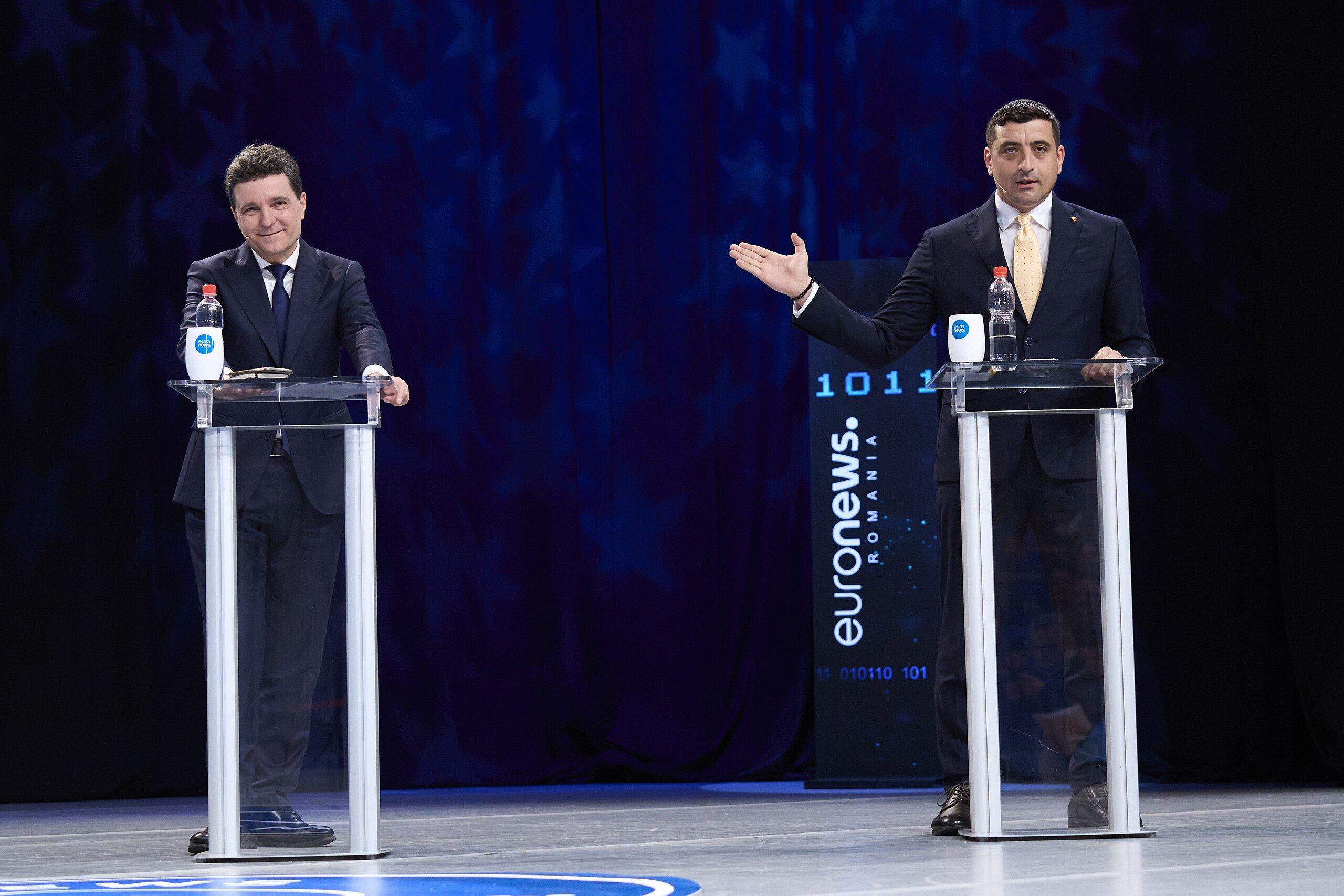






























































Nicușor Dan and George Simion during their only televised debate, on 8 May 2025.
Bucharest mayor Nicușor Dan bested sovereigntist George Simion in Sunday’s Romanian presidential election. Both were anti-systemic candidates of sorts. They were Romania’s established political parties that crumbled over the course of a half-year long electoral contest. Dan, a math Olympiad, once youth anti-corruption activist, and mayor of Bucharest, embodied the idealized self-image of Romania’s youth and thriving urban middle class professionals. Meanwhile, Simion, who at university studied “crimes of communism” and history, leaned toward symbols of national greatness. He called for reuniting independent Moldova (Bessarabia) with Romania, while embracing national and traditional values finding resonance among Romania’s culturally conservative population. He took a majority of both rural voters and of the nearly 1.7 million strong diaspora vote. These latter populations have struggled for decades with no political party championing their interests.
But the real winner of Romania’s May 18, 2025 presidential election was mass psychological pressure. The long election season started in November 2024 with Tik Tok’s algorithmic matches tossed onto Romania’ flammable electoral tinder. Democracy went rogue, escaping the reservation of the country’s long established political coalitions. Panicked, the Romanian government canceled the second round of presidential voting scheduled for December 4th before the upstart “sovereigntist” candidate Călin Georgescu could ignite a full-scale prairie fire laying waste to Romania’s political terrain. With the United States Embassy at its back, Romania’s government announced its canceling of the next round of elections scheduled for December 4th and banned its front-runner candidate. No disinterested observer, Romania hosts a rapidly expanding set of US military bases rapidly becoming a chief NATO forward force on the Black Sea. Thus, it was no surprise that this rip cord was pulled, aborting Romania’s elections and then blamed on (drumroll): Russia. Romania reprised the US’s MSNBC news network narrative that surely Americans in 2016 could not have “elected” the unctuous Donald Trump. America’s elites defaulted to the psychologically comforting narrative that “Russia did it.” In fact, Kremlin social media buys in the US 2016 election amounted to a paltry $100,000 that merely ran retreads of GOP social media memes and ads delivering nothing new to the campaign. No doubt Kremlin “Boris Badenov” operatives in a sort of Molotov-Ribbentrop Pact with Democratic figures such US Senator Adam “Shifty” (rightly dubbed by Trump) Schiff delighted in this narrative that Moscow steered the election result over any introspection that it represented socio-economic turbulence within Romania.
In the case of the US 2016 election, the reality was that Trump out hustled Democrats. Cambridge Analytica (CA) delivered superior data to the Trump campaign, meanwhile Democrats and Hillary Clinton were smugly satisfied that they were “superior” to the horrible TV reality star. Trump brought his one part tent revival, one part Hulk Hogan wrestling match and one part public lynching as Sunday entertainment program, to forgotten parts of Wisconsin eight times during that election that Hillary Clinton deemed unimportant enough to visit Wisconsin even once. And of course, let’s not forget Bernie Sanders, to whom Democrats gave the “et tu Brutus” treatment in both 2016 and 2020 (with Elizabeth Warren being called up from central casting in both elections to play the role of Brutus). This delivered tailwinds helping propel Trump toward both his electoral wins. In short, Trump’s victory was homegrown.
Meanwhile, Romania’s government in November asserted with the blessings of Washington and Brussels, that AI and social media deployed by nefarious interests sought to burn down Romania’s still youthful democracy. While true, this correlation does not necessarily make for causation on why Romania’s Georgescu won the first round of voting. With Biden gone on January 21, 2025 and Trump restored to 1600 Pennsylvania Avenue, the United States government flipped its position on Romania. On February 14th’s Munich Security Pact, U.S. Vice-President, J.D. Vance punctuated the point about Romania’s dubious actions taken on the score of democracy in shutting down its election and banning its most popular candidate for office. His argument, credibly, was that if small social media buys can derail elections, then democracy’s roots in Romania must be shallow. Meanwhile, Romanians were divided on its cancelled elections. For sovereigntists this was about their political voice, agency and government arbitrarily revoking their choice. For other Romanian voters the question was not electoral fairness, but the potential pending loss of US security guarantees and Romania adhering to its political liberal path. Bordering a war zone with what they term the “beast from the east,” many Romanians look to the United States for security. European leaders in the main also backed Romania’s government decision to cancel their second round of voting.
The anti-system nature of Romania’s elections continued this April and May. Candidates of Romania’s established political parties were rejected by voters. The interim social-democrat prime-minister resigned only to be replaced by another interim coming from the liberal center-right ranks. None of the candidates that qualified for the annulled second round in December 2024 were present on the May 18, 2025 final ballot. One candidate was prevented by the Constitutional Court from running, another got less than 3% in the first round of elections on May 4th. Yet, the April-May electoral campaign was spared from the Tik Tok campaigns of the previous November election. The banned sovereigntist Călin Georgescu was now replaced with a candidate one generation his junior. The 38-year-old George Simion who emerged from Romania’s nationalist soccer toughs, the Ultras. A self-declared admirer of all things Donald Trump, Simion sought to “Make Romania Great Again.”
The results of this shuffling of Romania’s electoral terrain in recent months was both surprising yet predictable. The political fights were predictable enough, but the final candidates emerged victorious, surprising. Both finalists came from outside the established national political landscape. Both claimed to be against Romania’s established political parties – one on the populist right, and one a mayor fusing liberal values and local politics. The electoral questions in play mirrored the same East vs West debate present at Romania’s post-communist founding over three decades back. Like a long jazz bee bop solo departing from melody the past many years, Romania this past year “returned to melody” with the questions of will Romania’s future be linked to the East? West? Or somehow exist outside both?
With the elections settled, Romania can be seen as suffering many losses this election. Large segments of society lost trust in the national project of embedding itself within a larger European Union values-based system; traditional political parties’ lost viability and possibly face extinction; trust in institutions to run elections shattered; voters residing within the country distrusting voters working abroad and vice-versa; trust in elections lost to AI algorithms; and the idea elections work in the public interest. But the current wave of anti-systemic currents against liberal democracy has common sources, chiefly economic insecurities and inequalities that are expressions of neoliberalism.
Romanians are merely the most recent nation having knocked the next brick off liberal democracy’s crumbling “Vital Center.” Romania in 1989 was thrust into the then forecasted liberal “end of history” that buried Central and Eastern Europe’s “really existing communism.” But for the “really existing democracies” of the time they themselves were already undergoing (borrowing Karl Polanyi’s term, who incidentally completed his dissertation in Cluj-Napoca, Romania) a “Great Transformation.” After the cataclysms of war, economic collapse and revolutions of the 20th century’s first half, social democracies were created in post-war West (including Japan). By the 1980s the stable social democratic post WWII orders, however, were being transformed into radical economic liberal orders anchored in the theories of Austrian and “Freshwater” (Chicago, et al.) economics. History leapt backwards, with a return to radical economic liberalism affixing itself as parasite, convincing its host (liberal democracy) that economic liberalism fed democracy rather than feeding off it. While imperfect, capitalism’s roughest corners were blunted and workers enjoying wages commensurate with productivity gains during the post-war embedded liberal compromise As Finland’s post war president Urho Kekkonen characterized this period “The Soviet Union created a workers paradise [long pause], just not in the USSR, but in Finland.” In short, authoritarianism on behalf of workers to the East, forced capital in the West to behave and create balanced economies enhancing political liberalism and social stability. The high-water mark of this embedded liberalism occurred under US President John F. Kennedy. His chief advisor, Harvard historian Arthur Schlessinger Jr. referenced the American political consensus as the “Vital Center.” While an idealized portrait of the period, this nonetheless was the model the communist Central and Eastern Europe bloc aspired to emulate upon achieving independence starting in 1989. For Romania, Europe’s most Christian country by percent of believers, independence fully arrived on Christmas Day in 1989, with the summary trial and execution of Romania’s Ceausescu ruling married couple. This ensured no counter-revolutionary rescue. The process was not unlike the Bolsheviks elimination of Czarist era Russia’s ruling family, although in this case not extending to, quoting Mick Jagger in 1968, “kill[ing] his ministers, while “Anastasia screamed in vain.” In short, government ministers and Ceausescu’s children were spared.
Rule under Ceausescu evolved from solid economic development in the 1960s, to imposition of a brutal austerity in the 1980s applauded by the International Monetary Fund (with debt-service payments made on time). This rendered many Romanians poor and embittered.
After 1990’s failed efforts to engage a program of national development for lack of investment capital, along with global manufacturing increasingly turning toward China’s then “reserve army of labor” low-wage labor, Romania embraced neoliberal policies. Ultra-low tax levels kept social services at minimal levels. German manufacturers seeking to outsource auto parts were attracted by Romania’s comparatively low wages. Meanwhile, agriculture lacked investment, while Austrians and others “mined” Romania’s forests for raw timber.
European structural funds modernized some infrastructure and Romania’s impressive human capital (in part resulting from communist-era investments in education) saw IT and other high-value added activities emerge in cities such as Cluj-Napoca and Bucharest that created prosperous middle classes, if not new power elite entrepreneurs. But for many Romanians not winning the genetic lottery of well above-average intelligence and access to opportunities in select urban areas, neoliberalism only offered low-wages, stress and Albert O. Hirschman’s classic formulation of “exit.” The 2008 financial shock rightly fueled democracy’s doubters when shackled by neoliberalism. Since Syriza’s 2015 failure in Greece to reverse neoliberal austerity, Europe’s electorates now seek relief from other quarters absent left policy choices. This opened the door to right-wing populists who promised alternatives in an era where no one else has. Thus, we have reached the moment when, quoting Vladimir Lenin, “when the lower classes [working class] do not want to live the old way and the upper classes cannot carry on in the old way.” Presently, only the populist right gives voice to sovereigntist alternatives, regardless of how viable in practice.
Romania’s election reveals a population under enormous pressure with an institutional system failing to respond to popular demands. The burden of democracy’s unrealized promises, partial loss of autonomy to EU officials in Brussels, neoliberal inequality and economic insecurity, adversity that pushed millions to emigrate, and concerns over war on Romania’s border have all placed “The Weight” on Romanians still seeking someone to “take the load right off me.”
The post Romania’s Presidential Elections: “Under Pressure, Pushing Down on me, Pressing Down on you” appeared first on CounterPunch.org.
This post was originally published on CounterPunch.org.